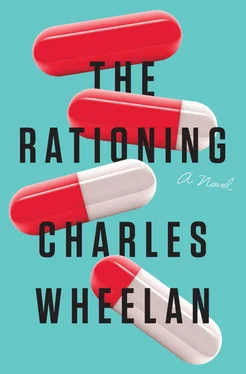Meanwhile, the Speaker of the House was continuing her self-immolation. As soon as the U.S.-China Friendship Agreement became public, her comment that we should “take seriously” what the Chinese have to offer was played over and over again, juxtaposed against the most egregious and the pettiest of the Chinese demands. This was totally unfair, of course, as the Speaker had made her comments before the terms of the agreement were known. No one seemed to care about the finer points of context in this case, however. The Speaker’s ascent had been built on self-interest, calculation, and power; those who crossed her over the years found themselves stripped of committee assignments or facing a well-financed primary opponent. Unlike the Senate Majority Leader, she had no deep pool of goodwill to draw upon during a rough patch. Machiavelli may have written that it is better to be feared than loved—the Speaker was definitely feared and unloved by the House rank and file—but that assumes one can hang on to power. Machiavelli did not live through the early 1990s when Eastern Europe Communist despots were toppled and citizens rushed through the streets knocking over their statues. (The leaders themselves typically fared worse than the statues.) The Speaker was no East European dictator, but the larger point still holds. Her power had been kicked from beneath her, at least temporarily. Meanwhile, the President’s support had surged to over 90 percent after the Air Force One show; most House members (never that popular) rushed to pledge their public support to the White House.
So yes, when Leonard Creelman went on This Week and pointed out that the President had used seventy thousand gallons of jet fuel (“an abhorrent carbon footprint”) just so he could “impress people eating hot dogs at baseball games,” he was absolutely correct. It is also true that a solid majority of Americans felt a powerful urge to punch Leonard Creelman in the face. (Even 53 percent of self-described progressives “supported” or “strongly supported” the President during the Outbreak, up from less than 20 percent during most of his tenure.) Meanwhile, the Tea Party, normally eager to lambaste the President for every nickel of public money he spent (that jet fuel is not free), was eager to have yet one more reason to blame China for America’s problems.
It is crucial to recognize two things. First, in just a matter of hours, the President had fortified his political position and gained the support of most Americans for whatever he would do next. Second, he had no idea what he was going to do next.
THE PRESS WAS ALWAYS A STEP AHEAD OF THE PUBLIC, AT least the print reporters were. While the video of Air Force One doing a loop over the Honolulu base and accelerating west was played repeatedly on tablets, and watches and eyeglasses, the more enterprising reporters grasped what must inevitably come next: we were going to run out of Dormigen. The NIH projections had never been public, but any reasonably intelligent person could connect the dots. We had a shortage of Dormigen; the Chinese offer was off the table; at some point “the constraint would become binding,” as the scientists like to say. And then what? The media was aware that the White House had “a number” with regard to likely deaths, and enterprising reporters redoubled their efforts to get it. As usual, the Internet was awash with bogus projections and reports.
On board Air Force One, the President basked briefly in the glow of his dramatic takeoff before confronting the same reality I was contemplating on the park bench. What now? The Dormigen supply across the country had finally been secured, though it was still uncertain where the stolen drugs would end up. As the President flew toward Canberra, the NIH projections were showing a range of likely fatalities from forty thousand to a hundred thousand. There was no full-blown Dormigen rationing in place yet. In theory, everyone who really needed the drug was still getting it, but the protocols for prescribing Dormigen had been tightened sharply to help make the existing stock go further: no prescriptions when another antibiotic might work; no prescriptions for non-fatal infections likely to heal on their own; no prescriptions for secondary infections among terminal patients; and so on. The video communications equipment on board Air Force One had been repaired during the long stop in Honolulu. (This was one small factor in the President’s decision to fly toward Australia; he was now as well equipped on the plane as he would have been in the Oval Office.) The Communications Director was urging the President to make another address to the nation, seizing on his surge in popularity to prepare the country for the possibility of fatalities. The President was noncommittal, presumably still hoping that those of us in the scientific community would pull an antidote out of a hat.
In fact, the first preventable fatalities had already happened. While all eyes were on a weakening Cecelia Dodds, other people were dying. An eighty-three-year-old man had been admitted to a hospital in Tucson with a severe case of pneumonia. He would normally have been prescribed Dormigen on admittance, but with the new protocols in place the emergency room physician prescribed a traditional antibiotic as a first line of treatment instead. The man’s condition worsened almost immediately and he died before he could be switched to Dormigen. In Atlanta, a much younger man, African-American, died in an emergency room after being denied Dormigen when he arrived unconscious in an ambulance. His mother gave a tearful press conference in which she alleged that her son had been denied the lifesaving drug because he was a young black male. The controversial civil rights leader Latisha Andrews rushed to Atlanta, where she planned to organize a protest against “Dormigen discrimination,” but before she had even landed at the airport it was widely publicized that the young man had suffered a massive stroke, not any kind of infection, and would not have benefited from Dormigen.
And then there was Larry Rowen, the smarmy Los Angeles nurse who inadvertently set in motion a massive law enforcement dragnet that would recover over twenty thousand doses of stolen Dormigen. Rowen was an aspiring actor who had moved to Los Angeles ten years earlier from Moline, Illinois, hoping to capitalize on his nursing background by getting himself cast in a medical drama. He was short and pudgy, with thinning reddish brown hair, a wispy little mustache, and a severe wandering eye. Rowen learned quickly that he did not have the looks to thrive in Los Angeles; he was further disappointed to discover that his nursing background offered no casting advantage in medical dramas. (As the balance of this incident will demonstrate, Larry was no genius.) Rowen supported himself in Hollywood by working at an exclusive plastic surgery practice in Brentwood and doing two night shifts a month at a twenty-four-hour clinic in Pasadena. It was in the former that Rowen developed a deep antipathy for the stars and starlets coming in to have their breasts, lips, calves, chins, and butts improved. And it was in the latter where he had access to Dormigen during the stretch when the supply was still unsecured.
Having stolen a thousand doses of a drug that was potentially more valuable than heroin, Rowen soon realized that he had a problem: he had no distribution network. There is a reason that drug kingpins offer a big cut to the street gangs that push their stuff; one cannot sell heroin (or stolen Dormigen) without finding customers, and it is hard to find customers when the product is illegal. Rowen had two additional challenges. First, the window during which his stolen Dormigen stash would be valuable was very small (and could close, if the government found some fix for the crisis). Second, as noted earlier, the man was no genius. He may have had a social conscience on par with the typical drug dealer, but he was not nearly so clever. Rowen—who remains fodder for late-night comedians—envisioned a scenario in which he could strike back at the Hollywood establishment while simultaneously enriching himself.
Читать дальше












